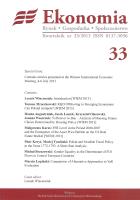Gender Equality as the Determinant of FDI Flows to Central European Countries
Gender Equality as the Determinant of FDI Flows to Central European Countries
Author(s): Michał BrzozowskiSubject(s): Economy, Supranational / Global Economy
Published by: Uniwersytet Warszawski - Wydział Nauk Ekonomicznych
Keywords: foreign direct investment; gender inequality; economic development; Central and Eastern Europe; gravity equation
Summary/Abstract: The purpose of this paper is to asses the weight of human capital and gender equality in explaining the bilateral FDI inflows to 11 Central European economies. The group comprises the ten countries that acceded to the EU in 2004 or 2007 and Croatia which is a candidate country since 2004. The focus on the region is justified by the fact that the European Commission acknowledged that fostering human capital development and gender equality is a condition of economic development. The period under investigation encompasses 2000-2009 and includes both the global FDI flows peak achieved in 2007 as well as the two years of sharp declines in 2008 and 2009. If FDI is mostly low-cost seeking oriented, however, gender inequality in health and access to education may create a pool of low-pay workers that can be profitably exploited unless the level of productivity is not seriously hindered by gender disparities. In this paper I argue that women’s representation in parliaments is another aspect of the gender gap that may shape foreign investors decisions. These hypotheses are verified in the framework of a standard gravity model using System Generalized Method of Moments technique.
Journal: Ekonomia. Rynek, Gospodarka, Społeczeństwo
- Issue Year: 2013
- Issue No: 33
- Page Range: 101-125
- Page Count: 25
- Language: English

